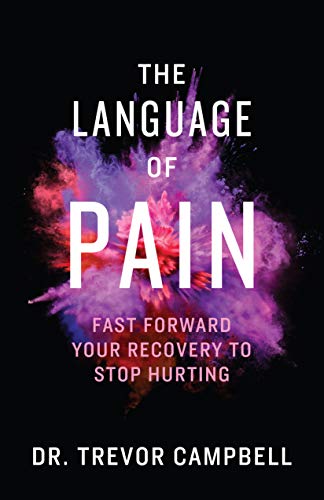
Publisher:
N/A
Publication Date:
N/A
Copyright Date:
N/A
ISBN:
N/A
Binding:
Paperback
U.S. SRP:
N/A
THE LANGUAGE OF PAIN
By Trevor Campbell


- Posted by IR Staff
- |
Chronic pain may be caused by illness or injury, but in either case, it frequently has a dramatic and disheartening effect on patients’ lives. Unlike acute pain, which is severe in the moment but eventually heals and goes away, chronic pain is a constant in the sufferer’s life, and can affect every aspect of their life, from family relationships and friendships to the ability to do simple household and personal care tasks. Dr. Campbell, in this book, suggests ways in which a chronic pain sufferer can learn to manage, live with, and to some degree at least alleviate their pain.
THE LANGUAGE OF PAIN is a kind and sympathetic book, offering guidance based on solid professional experience, presented in a gentle, understanding tone that neither condescends to nor dismisses the real concerns of the chronic pain sufferer. He points out, in clear and nonjudgmental language, the way that chronic pain can trap the sufferer in a vicious cycle, leading them to do less and less, isolate themselves from friends and family, and keeping them mired in depression and loss of mobility. He offers concrete suggestions for improving one’s situation, based on a multimodal approach that incorporates not only physical actions but also emotional and mental tools like meditation and cognitive-behavioral therapy.
Dr.Campbell’s advice is both general and specific, offering overviews of certain techniques to explain how and why they are effective, followed by specific and clear action items to get the patient started. He does not dismiss the importance of medications and other conventional treatments, and sensibly urges the patient to consult with his or her physician to ensure a coherent and tailored plan of treatment. Since chronic pain can make even simple tasks seem overwhelming, he offers a series of small steps that a patient may choose to begin with, offering a simple and practical way to get started on a pain management program. His suggestions seem useful and sensible, and it is possible for a reader to try the actions that best suit them individually or mix them as they see fit. The book is written in clear and easy-to-understand language, even when he gets (briefly) technical about the mechanisms of pain, and there is no intimidating jargon to wade through. He does not promise instant or even complete results, but does suggest that following a multimodal pain management plan may improve one’s quality of life substantially even if the pain remains to some degree.
While of course any chronic pain sufferer should consult with their own physician first and foremost, THE LANGUAGE OF PAIN can offer some outside guidance for the development of a pain management program tailored to the patient’s needs, that may help with both initial motivation and eventual success.
~Catherine Langrehr for IndieReader

Publisher:
N/A
Publication Date:
N/A
Copyright Date:
N/A
ISBN:
N/A
Binding:
Paperback
U.S. SRP:
N/A

- Posted by IR Staff
- |
IR VERDICT:
THE LANGUAGE OF PAIN: Fast Forward Your Recovery to Stop Hurting by Dr. Trevor Campbell, is a reminder that people do have a certain amount of psychological control over the pain they experience every day. Because the author does not favor excessive use of chemical painkillers, he maintains that Cognitive Behavioral Therapy is the answer and that retraining oneself to accept limitations allows humans to work with the brain and its neurological reactions–not against it. Readers dealing with chronic pain may find value in this concept if they are willing to focus on what they are able to accomplish psychologically, and not rely on medications that haven’t worked.

THE LANGUAGE OF PAIN
Trevor Campbell
Rated 4.5 / 5 based on 1 review.